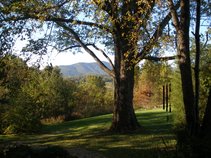Just looking at him, Everett Dixon did not inspire; crew-cut, short and stocky, brown eyes peering intently out of a pallid, round face underneath a blaze orange ball cap. A cigar dangled listlessly from his left hand. His red flannel shirt strained against a middle-aged belly swelling out over faded Levis. Everett was sitting on the porch swing of his small cabin in the Blue Ridge looking out over the Shenandoah Valley, the same cabin he and his father had used during hunting seasons many years ago.
It was a crisp fall day, glowing with late afternoon sunlight cutting long shadows in the woods beyond the clearing below. The sweet acrid scent of an early winter woodstove hung in the air. A pair of ravens were soaring in opposing circles, rising on warm currents, their trailing feathers rippling in the breeze. Everett could count each feather. He tapped his ash on the floorboard and leaned back on the swing, its squeaks breaking the quiet. Dust motes fluttered in the light.
Everett grew up in a rented ranch in a nearby hollow with a couple of older sisters long gone now – dead or locked up he had no idea, they weren’t much to look at after all. His tee-totaling, God-fearing parents kept Sunday sacred but profaned the weekdays nurturing a tribal hatred of anyone who hadn’t accepted Jesus Christ as their Lord and Savior. Pa worked at a turkey farm in the Valley, ramming birds into a killing cone day in and day out, imagining they were heretics. Ma worked for a local housecleaning company, scrubbing the floors of heathen. They made ends meet.
Growing up hunting deer and turkey and bear, Everett never missed. He couldn’t miss. Don’t count bear, they’re treed by baying hounds and GPS tracking, shitting buckets of fear, and summarily executed from close range. But from 1000 yards or more, a scope fitted deer rifle in the hands of Everett Dixon became a precision tool in the hands of a killing master. He could stand far, far away, peering intently into the woods or across fields, sense movement, see it clearly, and kill it. He didn’t need a deer blind, and the turkey’s notorious hearing couldn’t sense him from that far.
So Everett might not have inspired with his looks, or his simple background, or his rural lassitude, but his hunting skill would ultimately blaze a career path for him and astound a small coterie of devoted, trained professionals.
Everett was seventeen when Pa dropped dead of a heart attack on his way to work. It was lucky Pa hadn’t killed anyone sitting in that living room when his car crashed through the bay window and came to rest just inches from a crib as he lay slumped over the wheel. A year later, Ma’s emphysema had worsened so much she stopped working, and finally couldn’t get up the strength to keep her oxygen tank nearby. She died staring at the clock across from her faded chartreuse Barcalounger, wondering where Jesus was. Their Walker hounds howled until the neighbors took notice. The girls? He had no idea, nor could he care less.
With no prospects in the local economy, his family gone, and high school diploma in hand, Everett enlisted in the Marines. It was the height of the Vietnam War, and Everett figured that his skill with a rifle would give him a leg up. He made it through basic, and then on to advanced training in the sniper school.
He simply dazzled everyone. Everett had 20/10 eyesight. He was preternaturally calm. Not a tremor, no matter how contorted, or tired, or exhausted he might be. His hand was rock still, and his eyes as good as any human ever recorded. He sailed through sniper school, a quick study on calculating humidity, temperature, barometric pressure, Coriolis effect, bullet drop, windage, and leading to get a clean shot. It came to him naturally. He learned field craft, concealment, and surveillance techniques. Upon completion, Everett shipped out to the 1st Marine Division a few miles south of Danang and went to work.
Everett took a pull from his cigar and watched another pair of ravens join the lifting air currents. He could take those black birds out, right now, and wondered how many other people looked at everything as if it were a target. And how many of them knew the indescribable satisfaction of a clean kill, and how many fewer of them ever saw how slowly life ebbs when the meat sack that holds it springs a fatal leak.
It was acid and infrared that changed Everett’s life. Unlike many GIs in Vietnam who turned to reefer and heroin to ease the pain, calm the fear, or escape reality, Everett stumbled on a new way to enhance, enlarge, prolong, and intensify the kills he stalked every night; paper blotters of windowpane acid, sold by the handful in the streets of Saigon.
A buddy had described “tripping,” how acid could stretch and bend and warp reality, or more accurately, our perceptions of it. So, one night, draped in his ghillie suit looking like a swamp critter and carrying his M40 with night vision scope and muzzle flash suppressor, Everett slipped out of camp and carefully sidled his way into the kill sight about 500 yards away from a Vietcong encampment he had reconned a few days before. He put the blotter in his mouth, sucked on it, and waited as he peered through the scope at the enemy figures glowing red with thermal energy.
At first, nothing, but in a few minutes the red prey began to dance silently in reverse shadows lighting up the back of his brain, flooding through his eyeballs as if they were an entrance to his cave, his brain, his new reality. Shadow and light became one. Each specter had a name, a history, a family, a density. He could pick and choose, but he waited. He felt the whole camp inside of him, and he waited. In silent majesty.
He took his eyes off the scope and looked up at the night, multi-hued stars glittering like fire glass and so close he could pluck one right out of the sky and put it in his pocket. It thrummed there, like his whole body. But still so calm, a calmness that filled him with joy and promise and lust. He could wait out the world, be infinity itself. He turned back to the scope. Red prey dispersing, moving away, lessening, but one separating and moving closer. He fired.
The red prey dropped like a meteor. The other red prey rejoined the dance, came to his side, arms pointing excitedly looking around, looking right at him. Everett slid like a snake along his escape route, only the sound of the report still ringing in his cave and linked inextricably to the red prey, lying prone, dying. And from his escape perch, Everett watched through his scope as the red prey slowly changed color to an orange, and then yellow, green, blue, dark blue… and gone. Everett had watched life re-form, relocate, in dying color. He was mesmerized. He wanted more.
Everett re-upped three times before the Corps told him it was time to go. Truth be told, after 73 confirmed kills and probably the same amount unverified but real, Everett was a star, and they wanted him alive and out of theater to preserve the dignity of the Corps. He was a legend, and a teacher of new snipers, and a man who went to bed every night with red prey dancing on the walls of his brain. They had praised him for killing bad guys and saving good guys. But he knew that’s not why he did it.
Dusk had softened the light and the ravens had skimmed down the sides of the mountains on the shoulders of cooling air. Everett stood up and stretched, took a last puff of his cigar and threw the stub out into the grass. He turned around and walked through the screen door. It slammed loudly as he strode across the bare wood floor to his gun case.

